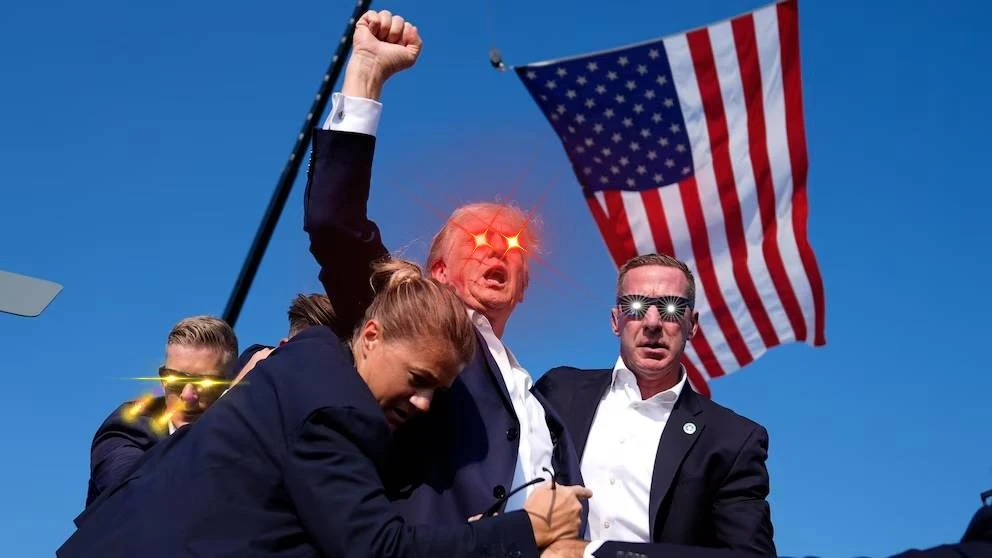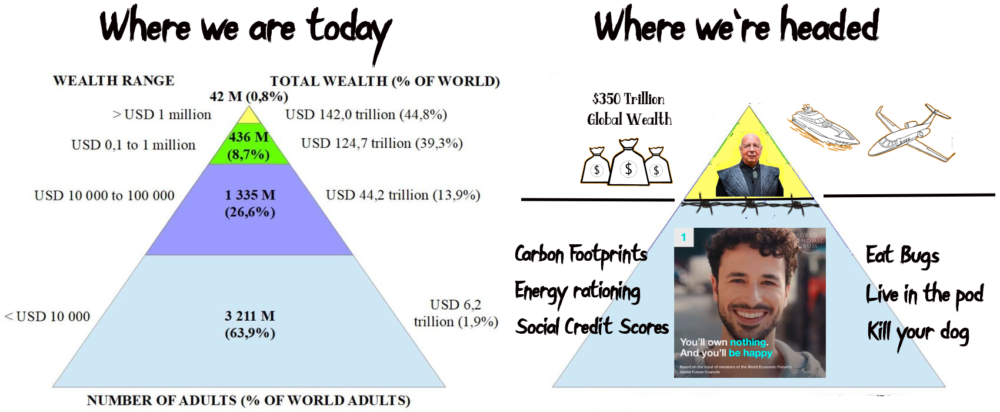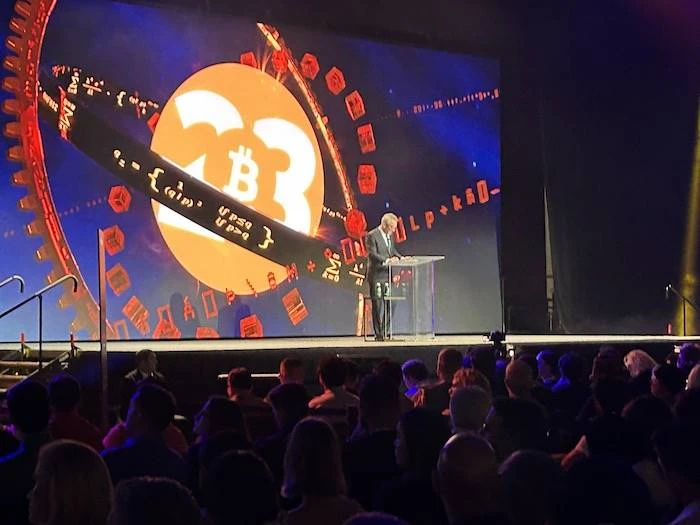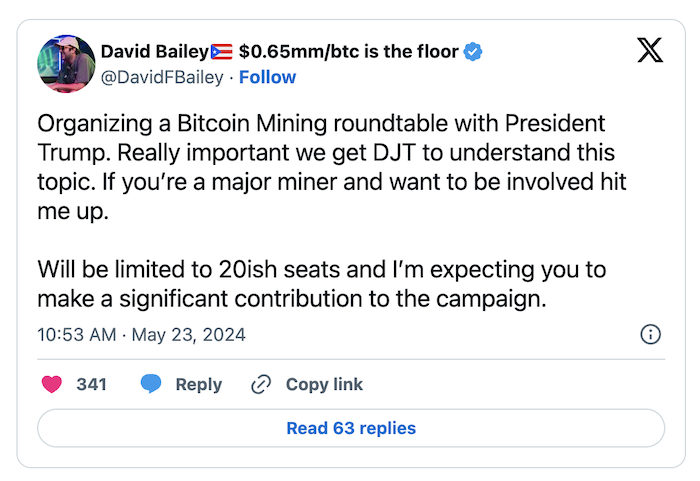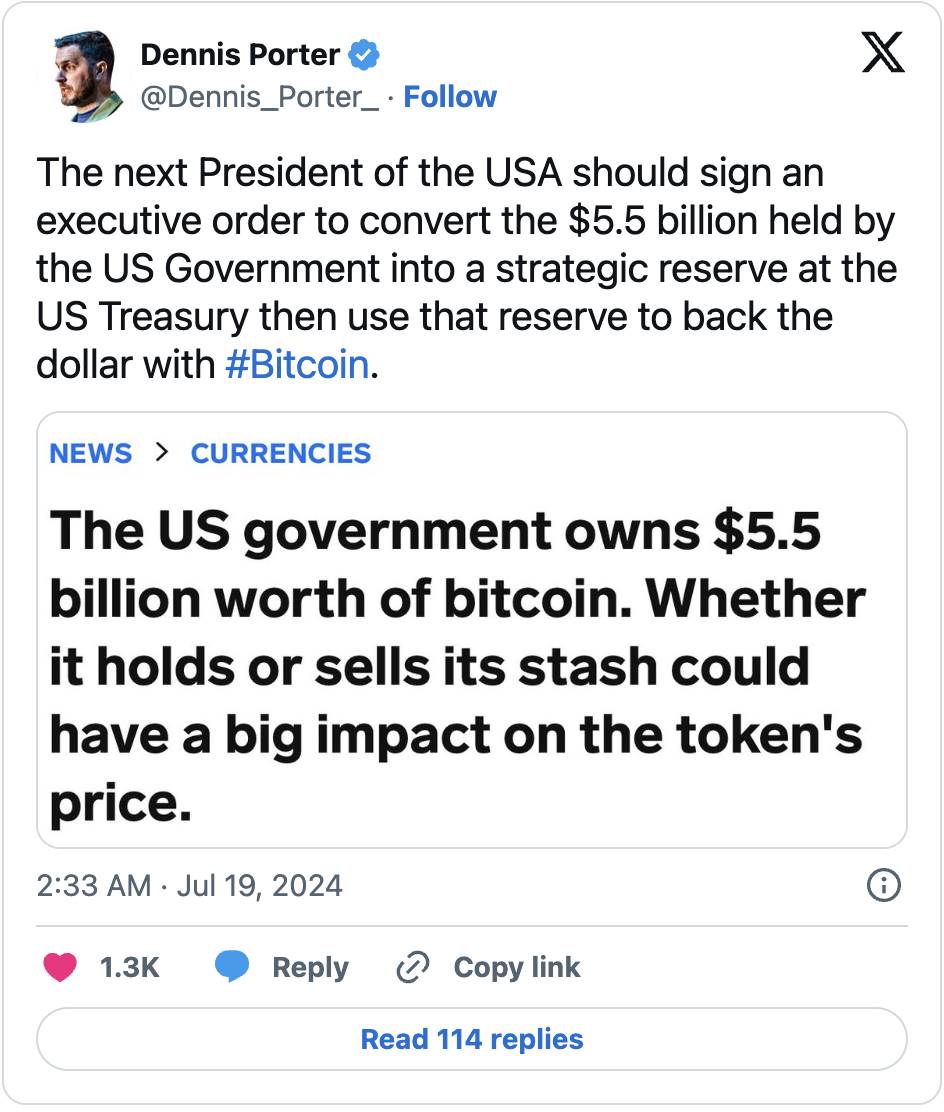원저자: Mark E. Jeftovic
원문: TechFlow
From “Emergency Currency” ( Notgeld ) to Bitcoinization in Less Twenty Years
“Just because something is inevitable doesn’t mean it’s going to happen.” —Douglas Casey
Anyone who has been paying attention has long known that central banks printing fiat money out of thin air, lending it to the state at interest, and pumping it into the economy will inevitably lead to wealth disparities in society so great that society will collapse.
This will develop to the point where a popular uprising threatens the position of the elite; the Cantillonian tycoons who create value in this illusory system and accumulate most of the wealth to the top class of society through inflation.
Class structure, present and future
My personal favorite quip is:
The end always comes sooner than anyone expects.
It’s been over three years since I published The Crypto Capitalist Manifesto , in which I laid out my fundamental investment thesis that the Great Reset isn’t actually about climate change or any of the UN Sustainable Development Goals — it’s really about debt:
“You will have nothing and be happy.”
Messages from the global elite, such as the World Economic Forum, the Davos Party, the International Monetary Fund, and even places as disparate as the Vatican and Hollywood, repeat the same theme: You, the middle class, the lower class, the masses—you’re going to have to get used to a lower standard of living.
The real reason is not climate change, not even COVID, it’s debt.
The world has finally run out of money, as it has in the past when the global economy threatens recession or when currency bubbles burst. We have been living beyond our means for decades and now it is finally over. We are here, we have reached this point.
The government has been overspending for decades and now the bill is due. The only way to repay will consist of a mix of inflation and austerity. This will be akin to the planned dismantling of the entire middle class. The easiest way to do this is to turn them into a completely dependent welfare class through endless lockdowns, universal basic income schemes and mandatory health passports.
Yet, at its core, the Great Reset is a monetary reset, a way of restructuring the global debt burden and turning “money” into the technical lubricant for grand social engineering projects: most of which are aimed at lowering the living standards of the masses in the developed world and suppressing living standards in the so-called Third World.
The “Great Reset” and “Build Back Better” attempt to lay the groundwork for the eventual and almost inevitable shift of fiat currencies to central bank digital currencies (CBDCs). These digital currencies will almost certainly be combined with social credit systems denominated in carbon footprint quotas , thus becoming a mechanism for enforcing austerity in the world’s debt-ridden economies, leading to a kind of “monetary apartheid.”
My mistake in the declaration
Besides the fact that I was assuming that events that would have taken decades to occur occurred in 18 months, there was another fundamental flaw in my analysis:
I first discovered Bitcoin during the Cyprus banking crisis in 2013, when people began to understand that “as safe as money in the bank” was no longer as reliable as it once was.
The Cypriots were hit with a 10% “bailout”, but even scarier still, bailout clauses are starting to appear around the world (again, quoting the Manifesto):
When the bailout was being planned and executed in March 2013, Eurogroup President Jeroen Dijsselbloem told interviewers that Cyprus would serve as a template for future eurozone bank restructurings.
The idea to enshrine an internal bailout framework into law emerged in my home country of Canada in April 2013, in the budget of the then Conservative Harper government.
Canada’s bail-in provision was retained in the budget even after Justin Trudeau’s Liberals came to power in 2015. In 2018, it officially became the Bank Recapitalization (Bail-in) Conversion Regulations.
In Australia, the Financial Sector Legislation Amendment (Crisis Resolution Powers and Other Measures) Act 2017 gives the Australian Government the power to implement bail-in.
The United States was one of the countries at the forefront of codifying bail-ins in legislation: the Dodd-Frank Act, passed in 2010 ostensibly to reform the banking sector in the wake of the global financial crisis, contained a “statutory bail-in” provision to restructure any “systemically important” bank that got into trouble.
In fact, new supranational bailout laws came into force in 2014, covering the entire G20.
The last time Bitcoin surged above $100 was during the Cyprus bailout. It has not traded in double digits since.
Even so, I never imagined Bitcoin would become the world’s reserve currency, or even anything beyond the post-Bretton Woods era we now live in.
As of 2022, my understanding of Bitcoin is still a global “Notgeld” – a German term that emerged during the hyperinflation period of the Weimar Republic in the 1920s and means “emergency currency.”
In Germany, individual towns started printing their own vouchers; during the hyperinflation in Zimbabwe, people started using prepaid phone and gas cards. Every hyperinflation has its emergency currency, and until early 2022, this is also my global hypothesis for Bitcoin.
Two things changed my perspective:
1. The United States seized the foreign reserves of two countries—regardless of who those countries were or what they had done to “deserve” such treatment.
2. During the Freedom Convoy, the Canadian government declared martial law and froze the bank accounts of the truck drivers and any citizens who supported them.
The first permanently changed the way nations decide how to distribute and hold their sovereign wealth.
The second incident also had a profound impact on individual citizens. It was the incident that changed the perspective of Robert F Kennedy Jr. A year later, he opened his historic keynote speech at Bitcoin 2023 in Miami by saying:
“I became a Bitcoin supporter when I saw what the Canadian government did to truck drivers.”
From that point on, Bitcoin is no longer just an “emergency currency” – a fallback currency in the event of a slow-moving global hyperinflation – but an inevitable part of the future monetary system.
The next US president has been brainwashed by the orange pill
Whatever you think of Donald Trump, whether he triggers one of the types of “Trump Derangement Syndrome” (TDS) (Type 1 = “Trump Derangement Syndrome”, Type 2 = “Trump Divinity Syndrome”), or whether you are more calm and objective, the fact is that the Republican Party led by Trump is almost certain to win the election on November 5th.
Trump is a staunch supporter of Bitcoin, as is RFK Jr. He has been brainwashed by the “orange pill” (thanks David Bailey and Bitcoin Magazine).
David Bailey: A Bitcoin mining roundtable with President Trump is being organized. It is very important to make Trump aware of this topic. If you are a major miner and wish to participate, please contact me. Seats will be limited to about 20, and I hope you can make a significant contribution to the campaign.
Trump announced that he “wants all future Bitcoin to be mined in the United States.” Of course, it’s not that simple, but he reiterated this point at the Republican National Convention, along with the right to self-custody:
Big announcement coming on July 27th
This year, Trump will give the keynote address at Bitcoin 2024 in Nashville, Tennessee. RFK Jr will also be in attendance. Both candidates are staunch supporters of Bitcoin, though one is destined to become president (I expect RFK to be in a position in the Trump administration in January 2025).
The insider information is that during that keynote speech, Trump is expected to announce his intention to create a strategic Bitcoin reserve for the U.S. Treasury.
Doing so might only require a signature on Inauguration Day, as the U.S. already holds about $5 billion in Bitcoin:
The next US President should sign an executive order to convert the $5.5 billion held by the US Government into the US Treasurys strategic reserve, which should then be used to back USD #Bitcoin .
The U.S. government holds $5.5 billion worth of Bitcoin. Whether it continues to hold or sells these reserves could have a significant impact on the price of Bitcoin.
Once this happens, we will enter a whole new landscape. The game theory of Bitcoin will be irreversibly altered on a global scale, and countries will be incentivized to follow suit.
Whatever the outcome, Bitcoin has crossed the Rubicon and it will continue to exist. It is no longer some kind of “emergency currency” to temporarily circumvent the collapse of global legal standards. It has now become part of the system.
This article is sourced from the internet: From emergency currency to bitcoinization, exploring the impact of Trump’s presidency
관련: Crypto Paradise|OKX Web3 Wallet에서 백개의 체인 세계로 들어가세요
퍼블릭 체인 붐 블록체인 기술의 중요한 진화적 형태로서, 퍼블릭 체인은 다양한 응용 시나리오와 고유한 기술적 특징으로 암호화폐 세계에서 화려한 낙원을 열어줍니다. 비트코인은 낙원을 지키는 청동 거인과 같으며, 디지털 골드의 지위와 자유와 공정의 정신을 상징합니다. 이더리움은 스마트 계약의 기적을 지닌 마법의 성과 같으며, 수많은 혁신적인 프로젝트가 번화한 거리에서 굴러다니고 뛰어다닐 수 있게 해줍니다. 솔라나, 폴리곤, 톤과 같은 다른 퍼블릭 체인은 각각 고유한 기술과 응용 프로그램을 보여주는 독특한 랜드마크 건물과 같습니다. 이 기괴한 낙원에서 다양한 예술가, 사업가, 장인, 창작자 등이 모여 함께 훌륭한 문명을 만들어냅니다. 확장성, 보안 및 분산화 간에 불가피한 상충 관계가 있습니다.
